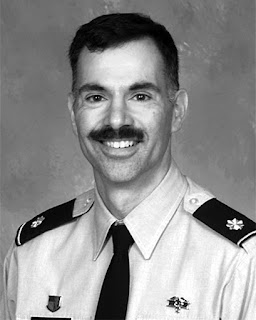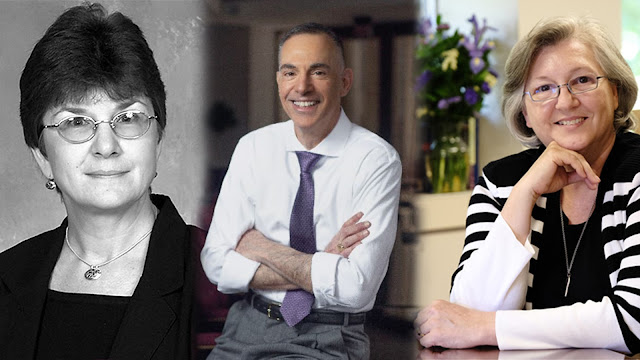USU Nursing Ph.D. Graduates Make “Profound Impact” in Nursing Science
The Uniformed Services University's Ph.D. in Nursing Science program celebrates 20 years of operation and more than 53 graduates.
May 12th, 2023 By Sharon Holland
Retired Army Col. Richard Ricciardi was among the first graduates of the Uniformed Services University’s (USU) Ph.D. in Nursing Science program in 2006. The program, which is celebrating its 20th anniversary this year, was established in 2003 at the request of Federal Nursing Service Chiefs to help develop military nurse scientists who could conduct research that supports the warfighter and DoD operational missions. Since crossing the stage at DAR Constitution Hall to receive his diploma, Ricciardi has been joined by more than 52 Ph.D. program graduates, each of whom has gone on to a career in nursing research.
 |
Retired Army Col. Richard Ricciardi was among the first graduates of USU's Ph.D. in Nursing Science program in 2006. (Photo credit: Tom Balfour, USU) |
“When the Graduate School of Nursing (GSN) Ph.D. program started in 2003, the signature curriculum was designed to include practice, research and educational experiences relevant to both military operations and federal health care. The curriculum had three focused research and practice areas: Operational Readiness in Changing Environments, Population Health and Outcomes, and Clinical Decision-Making in the Federal Health Care System, with cross cutting emphasis on patient safety, ethics, force protection, and international health,” says Mary Engler, Ph.D., director of the GSN Ph.D. in Nursing Science program. “The GSN doctoral program continues to prepare nurses to be uniquely qualified as leaders in research, education, and clinical practice to serve in the Military Health System, U.S. Public Health Service, and other Federal health systems.”
Engler says that nurse scientist students are educated to successfully conduct original research that generates new knowledge in areas relevant to military and Federal nursing.
“Our Ph.D. curriculum has been updated to begin with advanced graduate coursework in foundational philosophy and theoretical approaches, advanced research methods and analyses and specialty courses to develop substantive scientific expertise. Bioethics, health policy, data science, precision health and omics, and leadership courses have also been added,” she says.
After earning his Ph.D., Ricciardi completed his military career as chief of nursing research at Walter Reed Army Medical Center and director of research at the Defense Centers of Excellence for Psychological Health and Traumatic Brain Injury. Following retirement, he joined the Agency for Healthcare Research and Quality, where he worked for eight years as a healthcare scientist and program director, chief nursing officer, and later, director of the Division of Practice Improvement in the AHRQ Center for Evidence and Practice Improvement. Ricciardi left to join the faculty of the George Washington University in Washington, DC, where he served as professor and director of strategic partnerships for the Center for Health Policy and Media Engagement. In 2022, he was named executive director of the Center for Health Policy and Media Engagement, and is now serving as the interim associate dean for Clinical Practice and Community Engagement in the George Washington University School of Nursing.
Dr. Christine Engstrom, one of Ricciardi’s early classmates at USU, graduated from the program in 2007. Engstrom, a 32-year employee of the Veterans Administration, is director of Clinical Practice in the Office of Nursing Services at the VA. Engstrom also served as full-time faculty at USU following receipt of her Ph.D., and later served as acting Chief Nursing Officer for the VA from 2014-2015. She is an adult nurse practitioner who has worked in oncology for nearly three decades.
 |
Dr. Christine Engstrom, a 2007 graduate of the Ph.D. in Nursing Science program. (Photo credit: Tom Balfour, USU) |
“I absolutely loved my time as a doctoral student at USU. I started part-time [while working at the VA]; however, one semester I wanted to increase and take an elective so I moved to full-time in the second semester while also maintaining my oncology patients in clinical trials as well as continuing to teach at the University of Maryland each semester,” Engstrom says. “The Ph.D. allowed me to increase my role in research as I was appointed to the IRB [institutional review board] at the University of Maryland, mainly reviewing oncology proposals.”
Following graduation from USU in 2008, another early Ph.D. program student, Dr. Roberta Lavin, then a U.S. Public Health Service officer, served as the chief of staff for the Assistant Secretary for Preparedness and Response in the Department of Health and Human Services. She ended her 20-year Public Health Service career working with the poor and underserved, leading the research and development for a national disaster case management program.
After retirement, Lavin transitioned to a career in civilian academic health, serving as chair of the Department of Nursing at Clarke University in Iowa, professor of Nursing and director of the Family Nurse Practitioner program at the University of the Incarnate Word in Texas, professor and associate dean of academic programs at the University of Missouri St. Louis College of Nursing, executive associate dean of academic affairs at the University of Tennessee, Knoxville, College of Nursing, and now as professor of the University of New Mexico in Albuquerque and deputy director of its Center for Health Equity and Preparedness, where her current research focuses on bringing cultural competency around urban and rural communities to practicing nurses and disaster preparedness.
Although these are only a few examples of some of the program’s first graduates, throughout its 20 years, its 53 alumni have gone on to excel in positions that range from chief research and development officers to directors of Clinical Investigation divisions to chiefs of Centers for Nursing Science and Clinical Inquiry to health science administrators throughout the military and Federal health systems. They also include consultants to national organizations, and a number of University vice deans and faculty members. In fact, several of the program’s graduates have recently come back to USU and currently serve as faculty within the Graduate School of Nursing, including Drs. Cubby Gardner (2015), Dawnkimberly Hopkins (2016), Lalon Kasuska (2017), and Kennett Radford (2017).
“With the continuing evolution of academic rigor and the demand for new knowledge to respond to the needs of warriors and service members, the next 20 years hold promise for the continued excellence of the GSN Ph.D. program in preparing research scientists to enhance federal health and military health systems,” Engler says.
“We're very proud of the profound impact ALL of our Ph.D. graduates are having throughout our nation, and the contributions that they are making to the science of nursing that supports the health and care of those we serve,” says Carol Romano, Ph.D., dean of USU’s Daniel K. Inouye Graduate School of Nursing.





